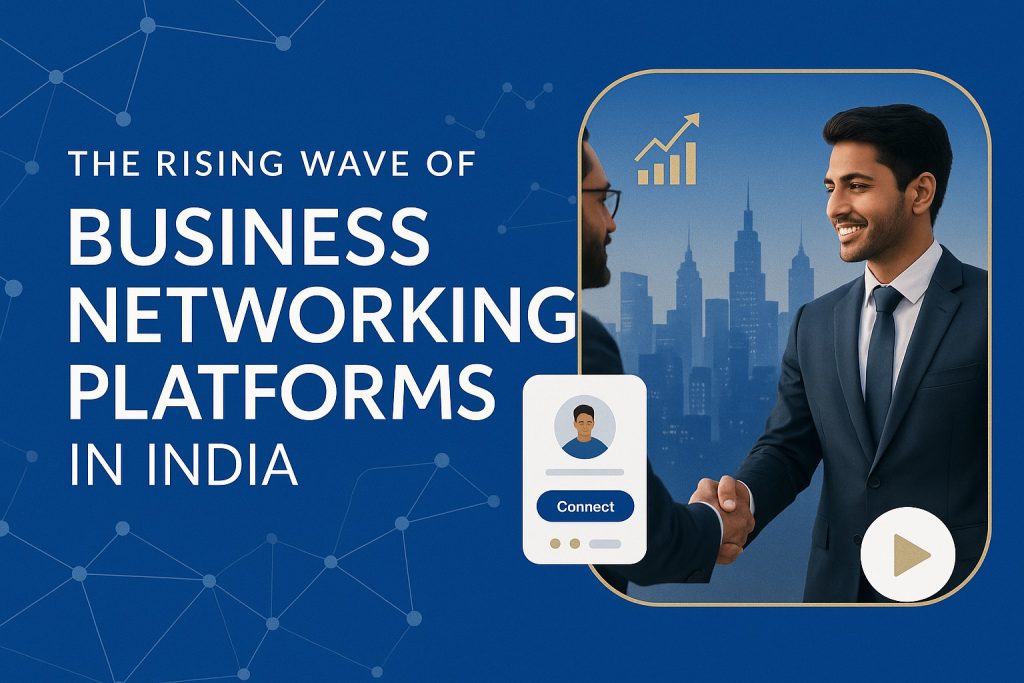In an age where meaningful business connections often unlock more value than ad spend or cold calls, structured business networking platforms have emerged as a powerful catalyst for entrepreneurial success in India. These ecosystems have transformed from informal gatherings into strategic, system-driven platforms that are helping thousands of Indian professionals build relationships, secure referrals, and unlock sustainable growth.
As India’s economic landscape matures and MSMEs (Micro, Small & Medium Enterprises) take centre stage in national development, structured business networking is quickly becoming the secret weapon of forward-looking professionals. The rise of these platforms in Indian metros—and now rapidly spreading across Tier-2 and Tier-3 cities—is no accident. It’s a response to a growing demand for relationship-based business development in a highly competitive digital-first world.
Let’s explore why structured business networking platforms are booming in India, what makes them work, and how they’re shaping the future of Indian entrepreneurship.
From Informal Circles to Structured Systems
Traditionally, Indian business owners relied on word-of-mouth referrals through family, friends, and community circles. While these continue to play an important role, they are limited in scale and consistency. Enter the structured business networking group—a curated community of like-minded professionals who meet regularly (weekly or monthly) to exchange referrals, share insights, and support one another’s growth.
These platforms formalize the age-old tradition of networking with a strategic process. Members are often carefully selected to avoid overlap in business categories, and meetings are held with clear agendas, time slots, and measurable KPIs. The results speak for themselves: many business owners report 6- to 7-figure annual revenue gains directly attributed to structured referral networks.
The India Advantage: Why Networking Thrives Here
India is fertile ground for this model, thanks to its cultural and economic characteristics:
- Relationship-centric business culture: Trust, familiarity, and rapport are the lifeblood of Indian business dealings. A structured networking system that emphasizes long-term relationship-building resonates deeply with Indian entrepreneurs.
- Rapid digitisation meets human connection: While digital marketing and social media have grown exponentially, they cannot replace the power of a handshake, a personal endorsement, or a face-to-face conversation. Structured networking offers the best of both worlds—offline trust-building with online support systems.
- Entrepreneurial explosion: With over 63 million MSMEs and a rising startup ecosystem, India has more professionals than ever seeking credible, consistent lead generation methods beyond paid ads. Business networking groups fill this gap, offering cost-effective access to quality prospects.
- Time optimisation: Well-designed networking systems are engineered to respect members’ time. Whether it’s a high-frequency weekly format that delivers compounded relationship value or a more strategic monthly format supported by tech, Indian business owners appreciate a format that aligns with their work-life dynamics.
The Two Dominant Models: What’s Working and Why?
Though various platforms exist, most fall under two primary models—each designed to cater to different business preferences. Without naming names, here’s how the models differ:
Model A: Frequency-Focused & Peer-Led
This approach emphasizes weekly, ritualized meetings—usually conducted early in the morning—where each member gets a structured slot to pitch their services. Leadership within the chapter rotates among members annually, fostering shared ownership. The group culture is deeply driven by discipline, accountability, and a sense of community.
Business professionals who thrive in this model often appreciate:
- A clear system with measurable ROI (referrals tracked weekly)
- The ability to build familiarity and trust through regularity
- Access to a large network beyond the local chapter
- Affordable membership dues and time-tested systems
This model has seen remarkable growth in India—particularly in metros and now even in smaller towns—thanks to its adaptability to India’s affinity for routine, community bonding, and consistent results.
Model B: Efficiency-Oriented & Professionally Managed
This newer approach to networking focuses on monthly in-person meetings supported by robust technology that enables 24/7 networking via mobile apps. Unlike the peer-led model, each group is facilitated by a professional leader or franchise owner. Members aren’t expected to recruit new members or take on volunteer leadership roles.
Key strengths of this model include:
- Professionally scripted agendas that deliver educational and business insights
- Inclusion of value-added services such as marketing videos, software tools, and business consultations
- ROI guarantees that incentivize members to engage and give referrals
- An innovative tech interface that enhances communication, feedback, and referral tracking
Though newer in the Indian market, this format is gaining attention—especially among tech-savvy business owners, younger professionals, and entrepreneurs with busy schedules who prefer a more curated experience over weekly commitment.
What’s Fueling the Momentum?
The success of these platforms lies not just in their structure, but in the value they deliver across multiple dimensions:
- Referral-based Revenue: Members routinely report significant portions of their annual business coming directly from these platforms. Structured referrals are warm, high-conversion leads—not just random connections.
- Skill Building: Most platforms include modules or workshops on improving public speaking, sales pitches, negotiation, and relationship management.
- Visibility & Branding: Regular exposure to a high-quality peer network helps position professionals as thought leaders within their category.
- Support Ecosystem: From emotional resilience to practical advice, being part of a trusted circle builds business confidence. In uncertain times, this becomes priceless.
- Hybrid Evolution: Post-pandemic, many platforms have embraced hybrid or tech-augmented systems—meeting offline while leveraging apps to stay connected daily.

What’s Next: The Future of Business Networking in India
India is entering an exciting phase of structured networking. As these platforms continue to evolve, we can expect:
- Deeper penetration into Tier 2 and Tier 3 cities: Networking no longer belongs only to urban elites. Entrepreneurs in cities like Ludhiana, Bhubaneswar, Surat, and Kanpur are actively joining structured groups and experiencing real growth.
- Specialised verticals: As networks mature, niche communities within healthcare, legal, tech startups, and women-led businesses are likely to gain prominence.
- Entrepreneurial opportunities: Running a networking group is increasingly being seen as a business in itself. Professionals are exploring franchise models to create impact, earn recurring income, and become facilitators of economic growth in their regions.
- Greater focus on ROI: Whether through analytics, app features, or guarantees, members want measurable value. The platforms that deliver real business impact will dominate the next wave.
Final Thoughts: A Movement, Not Just a Meeting
Business networking in India is no longer just a calendar event—it’s becoming a culture, a mindset, and a proven business development tool. As the Indian economy diversifies and scales, the demand for authentic, consistent, and high-quality referrals will only grow.
And while each platform has its strengths, choosing the right one for your business depends on what you value most—discipline or flexibility, peer-led or professional guidance, frequency or focus, tradition or innovation.
Want a Comparative Industry Report?
We’ve conducted an exclusive research-based comparative analysis of the two most dominant business networking models in the U.S. and India. This report includes in-depth insights on:
- Business models and revenue potential
- Franchise opportunities and ROI
- Technology integration and innovation strategies
- Success drivers in the Indian market
- Cultural fit, future trends, and member expectations
Due to the detailed and strategic nature of this study, the full report is available by request only.
📩 To request your copy:
- Connect with me personally on LinkedIn and send a message
- Or fill out the contact form on my website at www.hemant.co.in/contact
Let’s connect if you are:
- A business professional curious about joining a powerful networking platform
- An entrepreneur exploring franchise opportunities in the business networking space
- A consultant or trainer interested in facilitating networking groups
This report can help you choose the right path and position yourself at the forefront of India’s fast-evolving business networking ecosystem.
Book Online Consultation Session
(Limited slots | Pre-registration required)
Clarity costs nothing — confusion costs everything.
Let’s begin your growth journey.
📱 WhatsApp: +91 98116 81687
📧 Email: mail @ hemant .co .in
🌐 www.hemant.co.in

